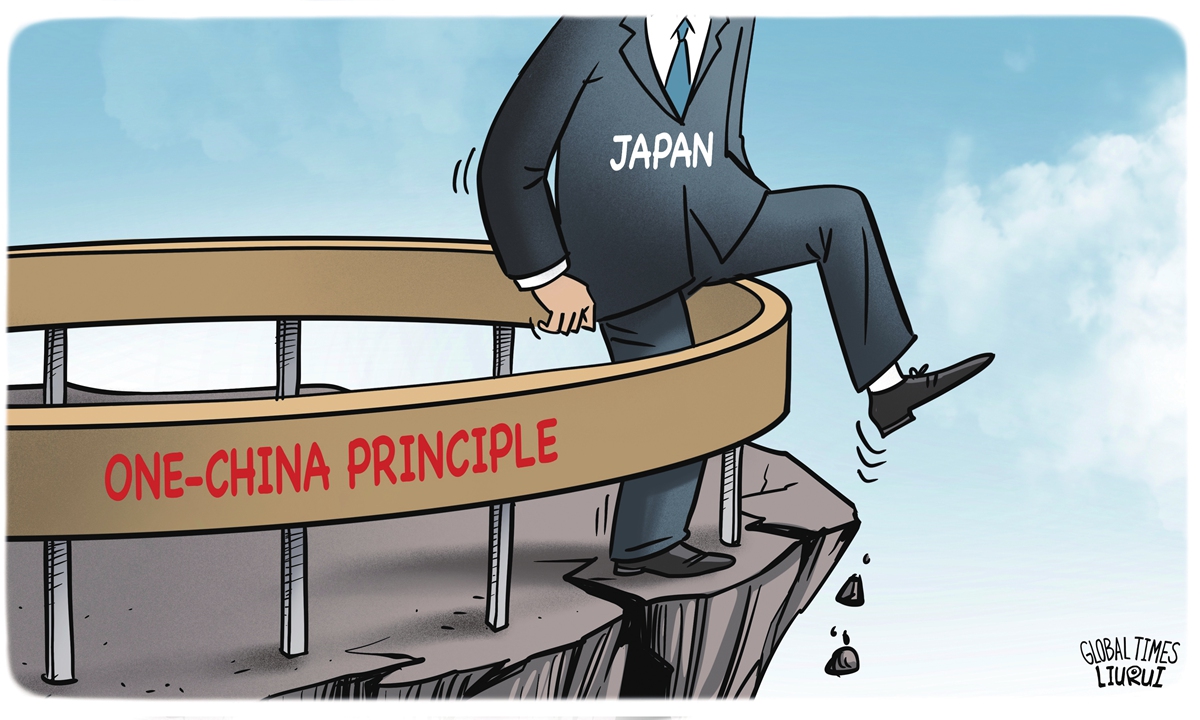
Illustration: Liu Rui/GT
Japanese Prime Minister Sanae Takaichi a few days ago claimed in a Diet debate that if warships were used or other armed actions are involved in the Taiwan Straits, it could constitute a "survival-threatening situation" for Japan. The absurdity, heinous nature, and malicious intent behind her remarks have shocked the international community. This is not only a blatant trampling of international justice and an open provocation against the postwar international order, but it also constitutes serious damage to China-Japan relations. These erroneous statements have already impacted bilateral relations and regional peace, and are the root cause of the recent deterioration in bilateral relations. The truth is crystal clear.
However, the evolving situation of the past two days indicates that some forces are attempting to shift the focus, downplay the severity of Takaichi's remarks, and place the blame for the deterioration of China-Japan relations on China. The most typical example is the hype surrounding statements made by a Chinese diplomat in Japan and the reactions of Chinese public opinion. These voices did not mention the extreme danger of Takaichi's remarks. Instead, they turn their guns on China, claiming that it should not have "overreacted." Japanese Foreign Minister Toshimitsu Motegi even inexplicably demanded that China take into consideration "the broad direction of Japan-China relations." This is a complete distortion of the facts and a case of blaming the victim, further confirming that the lack of postwar reflection within Japan is systemic. Meanwhile, some Western media outlets are also echoing this sentiment, sensationalizing the so-called "China responsibility theory" to escalate the dispute.
This rhetoric reduces a major dispute concerning China's sovereignty and territorial integrity, Japan's path of development, and the postwar international order, to a trivial debate about whether certain "expressions" were appropriate.
What Takaichi's fallacies have provoked is not a "war of words" between China and Japan, but rather exposed three fundamental questions: First, will Japan continue to follow the path of peaceful development, or attempt to repeat the mistakes of history? Second, will Japan safeguard the broader framework of China-Japan peace, friendship, and cooperation, or push bilateral relations toward confrontation and conflict? Third, will Japan act as a defender of regional peace and stability, or drag East Asia into the abyss of war? It is clearly Tokyo that must provide serious explanations to China and the international community regarding these three major questions.
In its history, Japan has repeatedly launched wars of aggression in the name of "national survival." During the "September 18 Incident" in 1931, for instance, Japan claimed that "Manchuria and Mongolia are the lifeline of Japan." When attacking Pearl Harbor, it promoted the idea that "the Greater East Asia Co-Prosperity Sphere is a battle for Japan's survival." Such deceptive slogans were systematically used by Japan's military, government and media to create a false sense of existential crisis - "Japan will perish if it does not expand" - thus concealing its imperialist ambitions. Today, Takaichi's attempt to link China's internal affairs with a so-called "survival-threatening situation" in Japan is nothing more than a revival of that same deceit. It reveals the dangerous intentions of certain Japanese political forces to exploit the Taiwan question as a pretext to break free from the constraints of the Peace Constitution and return to military expansion.
Taiwan belongs to China. How the Taiwan question is resolved and how national reunification is achieved are matters solely for the Chinese people. Should Japan attempt to intervene militarily in the Taiwan Straits, it will face grave consequences.
As Japan's prime minister, Takaichi's repeated release of wrong signals to "Taiwan independence" forces is not only a blatant interference in China's internal affairs but also an act of binding Japan once again to the chariot of geopolitical confrontation, threatening peace and security in East Asia. All peace-loving people around the world should remain highly vigilant about this.
Therefore, regardless of how some forces employ "smoke and mirrors," discussions about the issue must return to and focus on its essence: the profound impact and real threat of Takaichi's statements on Japan's future direction, China-Japan relations, and peace and stability in East Asia. Those who attempt to play with "wording" are deliberately obscuring fundamental issues: Who is the provocateur? Who is the victim? Takaichi's remarks are the "cause," while China's response is the "effect." Whether this round of disputes between China and Japan escalates ultimately depends on whether the Japanese side can immediately correct and retract its offensive statements. The international community should not lose focus on this issue; rather, it should collectively urge Japan to ease the situation. Indulging and appeasing provocateurs will inevitably lead to more arrogant provocations, pushing China-Japan relations and the regional situation toward a more dangerous abyss.
The claim of a "survival-threatening situation" by certain forces in Japan is strikingly similar to the excuses used by Japanese militarism during its previous aggressive wars of invasion. However, times have changed. If Japan seeks to employ the same tactics again, not only will the Chinese people not accept it, but it will also receive no support in the region. Those who truly need to take into consideration "the broad direction of Japan-China relations" are some radical forces within Japan. They must immediately correct their erroneous words and actions. If they continue to "play with fire" on the Taiwan question, the outcome will be tragic, and Tokyo will bear full responsibility.



